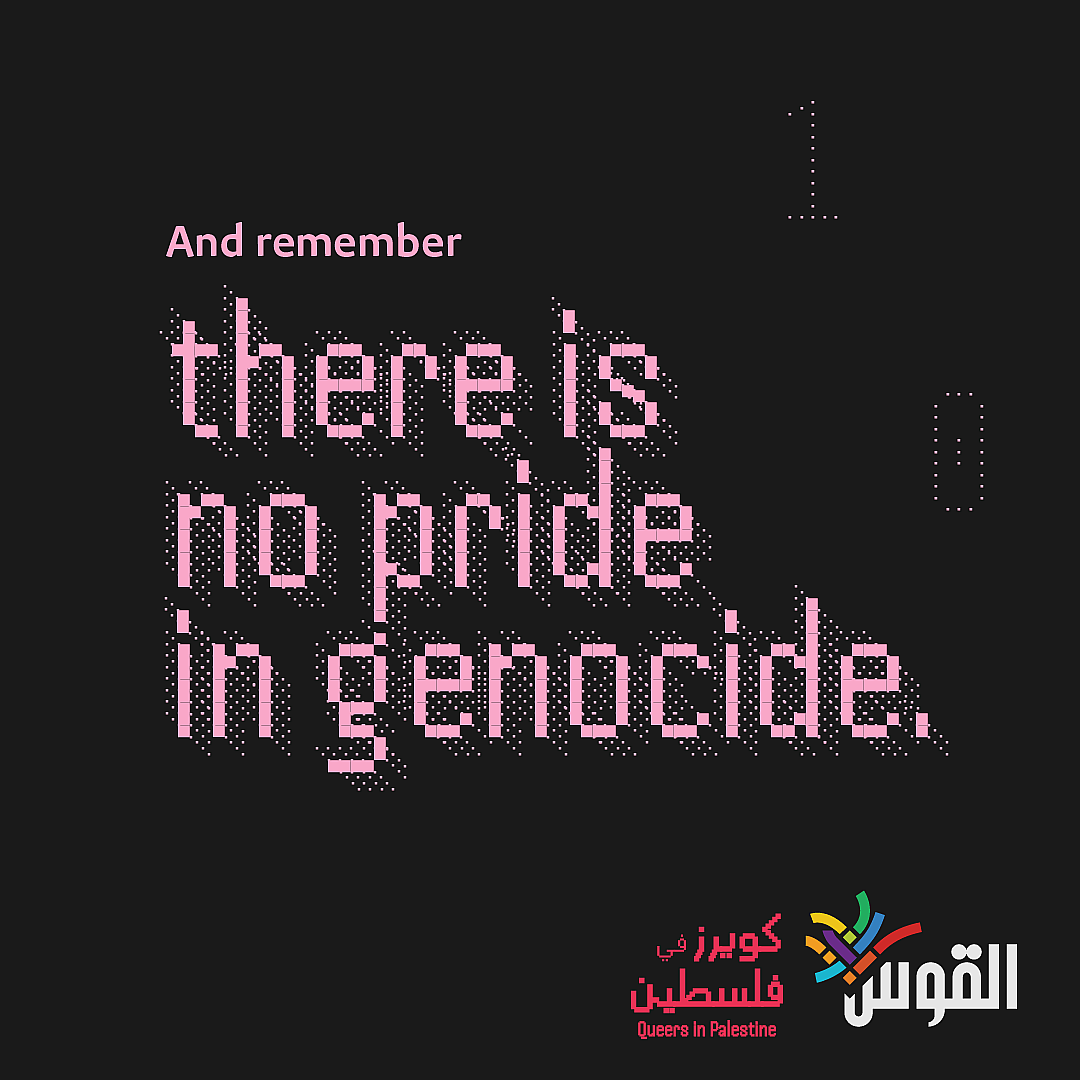1.
At a time when the world's attention is focused on Palestine, we are looking outward from within - our land holds not only the immense pain and loss of the past and present, but also the steadfastness, hope, and longing for liberation and return. Over the past eight months, queer anticolonial social and political movements across Palestine have watched in despair as the horror of the most live-streamed genocide of our lives unfolds. The absence of a clear political horizon, coupled with feelings of pain, helplessness, and frustration, is compounded by the increasing number of Gazans killed, the abduction of hundreds of Palestinian activists from Jerusalem and the West Bank and 48 territories, the escalating settler violence, and displacement of our people from our lands.
2.
Our feelings of fear were echoed by the deafening silence of many social and political organizations and activists who continue to face persecution and censorship since October 7th, alongside self-policing. This reality forced our organizing efforts into more clandestine channels, where we had to re-invent our organizing strategies to both ensure safety and security to our networks and guarantee that our political work remains sustainable in providing mutual aid, community care, as well as housing and flight support to people affected by the genocide, in and out of Gaza.
3.
It isn’t that we are disillusioned that nation-states were beacons of “democracy” and “justice,” but, more than ever, our distrust grows heavy with the international community’s complicity in the killing of our people, providing symbolic and material support to our killers. This is especially painful when we know that nothing from the aforementioned could be comparable to the reality of Gazans trying to survive the imperially supported and Zionist-sanctioned starvation, prohibition of medical care, and the exercise of sexual, psychological, and fatal warfare. This double-edged paradigm pushed us to reflect on our organizing and the realities of queer communities in Palestine, at least the communities we are in touch with daily. We are writing to share some of the insights:
4.
In times of anguish, as well as, in times of growth and political unity, building communities and relationships is the most sustainable, urgent, and crucial thing to do—especially in response to mass destruction, carnage, and displacement. As all internationally sanctified frameworks familiar to us are proving to be useless, from human rights to nation-state models, international law, and liberal identity politics of representation, it is time to continue our labor in building queer communities across Palestine and beyond to support each other.
5.
It is time to disengage from any Western framework, including LGBT and queer political and organizing frameworks that are complicit with the genocide in Gaza, and to resist colonial Western domination forced on our movements through complicit funders and global allies whose interest ends in our queer identities. Resist hollow human rights frameworks, commercial and depoliticized pride and visibility, and homophobia and identity politics organizing, and connect to our local wisdom and power.
6.
We must continue to divest from identity politics and the pressure to frame our work only as LGBT and queer and not as an active part of building our liberation. While homophobia and transphobia don’t disappear in times of war - and may even increase - we have the responsibility to find ways to engage with society and understand the relationship between sexual & gender violence and the violence of colonialism against us. While our queerness was diminished during these painful months, our mere Palestinian-ness is undergoing the most brutal forms of literal erasure. Many Palestinian queers speak in our community spaces about the latter and not the first.
7.
It is time to reframe our collective understanding of sexual and gender violence carried by the Zionist entity in this genocide and beyond as an inherent pillar of its settler-colonial project. The footage that we have been witnessing regularly, of Israeli soldiers posing with their rainbow flags and other Western gay symbols atop the ruins of our society, alongside genocidaires boasting about their sexual abuse, torture, and rape of Palestinian men, women, and children, only affirms what the Palestinian queer movement has been saying for decades: the Zionist colonial enterprise is predicated on the sexual abuse of Palestinians. Adopting an anticolonial, anticapitalist queer framework in understanding our reality is not merely an option, but a necessity.
8.
It is time to end LGBT organizations' complicity with genocide and challenge performative queer global activism, as well as refuse to participate in performative statehood celebrations while Gaza is being erased. It is not too late to recommit to the abolition of the zionist entity and the liberation of Palestine. Invest in the abolition of every system of oppression and join a queer group in your city or create one, join the new demonstrations taking place inside Palestine, the West Bank and 48 territories and take your queer friends with you. And for our comrades around the globe, continue to escalate through local demonstrations and direct actions.
And remember: there is no pride in genocide.
